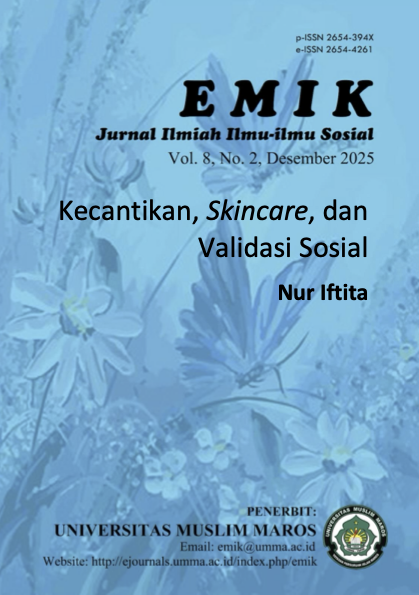Kecantikan, Skincare, dan Validasi Sosial
DOI:
https://doi.org/10.46918/emik.v8i2.2950Keywords:
Beauty, Bening's Skincare, Perception, Social Validation, Social ExpectationAbstract
Facial skincare has become a cultural practice that serves not only as a functional necessity but also as a means of seeking social validation. Although most research on beauty focuses on purchasing decisions and marketing effectiveness, the role of social validation in shaping consumer experiences and satisfaction with skincare products has not been widely explored, and this article fills this gap.
Using a qualitative approach, this study involves ten informants consisting of two housewives, three content creators, two make up srtists and college students respectively, and a high school student. Their age ranges between 17 and 27 years, and they are active users of Bening's Skincare in Makassar. Data collection was conducted by combining observation on social media platforms and in-depth interviews.
The study shows that consumer perceptions are formed through two main aspects: expectations influenced by visual testimonials on social media and interpersonal recommendations, and safety perceptions that become critical considerations, especially after the "blue label" controversy. Three main factors influence product selection: recommendations from close friends/relatives that provide interpersonal trust, the influence of social media that provides visual evidence and social proof, and suitability to personal needs based on individual skin conditions. Social validation plays a significant role in mediating between individual needs and social expectations. It operates through three dimensions; recognition through appearance transformation, social feedback, and social pressure. Positive validation occurs when the environment provides affirming responses such as compliments and positive attention, while negative validation occurs by critical responses from other or by comparison between those who have good-looking skin condition and who have bad-looking skin condition that create pressure to improve skin conditions. Consumers know they are being validated through direct comments, changes in social interactions, engagement on social media, and comparisons with others in their social circle. It is argued in this article that skincare consumption is not solely based on functional needs, but is also shaped by complex social dynamics, where consumers negotiate their identity amid beauty standards mediated by social media and pressures to maintain appearances that align with social expectations.
References
Aneshensel, C. S. 1992. “Social Stress: Theory and Research.” Annual Review of Sociology 18: 18–38, https://journals.sagepub.com/doi/abs/10.1177/002214650504600301, diakses tanggal 15 September 2025.
Angelica, C., Tercia, C. Y., dan Murniadi, K. 2020. “Studi Hubungan Kredibilitas Influencer, Parasosial, Nilai Merek, dan Niat Pembelian Produk Kosmetik”. Kajian Branding Indonesia, 2(2), 300-336. https://journal.prasetiyamulya.ac.id/journal/index.php/kbi/article/view/608, diakses tanggal 27 Oktober 2025.
Aprilia, B. 2025. Pengaruh Viral Marketing, Online Marketing dan Turbo Marketing terhadap Keputusan Pembelian Produk Bening’s Skincare Ditinjau dari Perspektif Bisnis Islam: Studi pada Pengguna Produk Bening’s Skincare di Kota Bandar Lampung. Disertasi, UIN Raden Intan Lampung, Lampung.
Ayuningrum, C. K., dan Daulay, H. 2024. “Konstruksi Kecantikan : Makna Cantik oleh Mahasiswi Pengguna Skincare Korea”. Jurnal Sosiologi Nusantara, 10(1), 1-17, https://ejournal.unib.ac.id/jsn/article/download/31370/14875/109468, diakses tanggal 20 Oktober 2025.
Cialdini, R. B. (2009). Influence: Science and practice. New York: William Morrow.
Creswell, J. W. 2013. Steps in Conducting a Scholarly Mixed Methods Study. California: Sage Publication.
Douglas, M., Wilk, R., dan Isherwood, B. 2021. The World of Goods. Routledge. https://www.academia.edu/download/64720689/DOUGLAS_M._O_mundo_dos_bens.pdf, diakses tanggal 27 Juni 2025.
Islamey, G. R. 2020. “Wacana standar kecantikan perempuan Indonesia pada sampul majalah”. Femina. Jurnal Pikma Publikasi Ilmu Komunikasi Media dan Cinema, 2(2):110–119, https://doi.org/10.24076/PIKMA.2020v2i2.400, diakses tanggal 5 Januari 2025.
Labibati, D. I. 2024. Peran Influencer Marketing, Citra Merek, dan Kualitas Produk Terhadap Keputusan Pembelian Produk Bening’s Skincare. Skripsi, UIN Syarif Hidayatullah, Jakarta, https://repository.uinjkt.ac.id/dspace/handle/123456789/80726, diakses tanggal 10 Oktober 2024.
Maharani, A. R. 2024. “Pengaruh Brand Ambassador dan Brand Image Terhadap Keputusan Pembelian Produk Bening’s Skincare dengan Truthworthiness Sebagai Variabel Intervening”. Jurnal Ekonomi dan Ekonomi Syariah, 7(1): 1037–1052, https://doi.org/10.36778/jesya.v7i1.1529, diakses tanggal 10 Oktober 2024.
Mappe, U. U. 2023. “Analisis Mitos Kecantikan Perempuan Dalam Iklan Kosmetik Lokal Dengan Brand Ambassador Idol Korea Selatan”. Aksiologi: Jurnal Pendidikan dan Ilmu Sosial, 4(1):116–128, https://doi.org/10.47134/aksiologi.v4i2.202, diakses tanggal 21 Desember 2024.
Pasaribu, N. V., dan Sitorus, D. H. 2024. Pengaruh Citra Merek, Word Of Mouth dan Keragaman Produk terhadap Keputusan Pembelian Produk Benings Skincare di Kota Batam. Skripsi, Universitas Putra Batam, http://jmas.unbari.ac.id/index.php/jmas/article/view/1594, diakses tanggal 9 Oktober 2024.
Piliang, Y. A. 2018. Teori Budaya Kontemporer: Penjelajah Tanda dan Makna. Yogyakarta: Jalasutra.
Rahmalia, Y. P., & Saputro, E. P. (2025). Beauty Vlogger Fiani Adilaa dan Pembentukan Narasi Kecantikan. Linimasa: Jurnal Ilmu Komunikasi, 8(1), 1-20, https://journal.unpas.ac.id/index.php/linimasa/article/view/21435, diakses tanggal 25 Oktober 2025.
Ratri, G. F. M., dan Amalia, D. 2023. “Penerimaan Perempuan Terhadap Standar Kecantikan Korea dalam Iklan Y.O.U ‘Symwhite 377 Radiance Up! Brightening Series X Kim Soo Hyun’ di Instagram”. Nusantara: Jurnal Ilmu Pengetahuan Sosial, 10(11):5066–5077, https://doi.org/10.31604/jips.v%25vi%25i.%25Y.%25p, diakses tanggal 5 Januari 2025.
Thangbiakching dan Kapoor, N. 2020. “Understanding Social Validation as a Process and Lived Experience among College Going Students in Delhi,” International Journal of Advance Research and Innovative Ideas in Education, (3):1222-1229, https://www.researchgate.net/publication/342305302_UNDERSTANDING_SOCIAL_VALIDATION_AS_A_PROCESS_AND_LIVED_EXPERIENCE_AMONG_COLLEGE_GOING_STUDENTS_IN_DELHI, diakses tanggal 15 September 2025.

Downloads
Published
Issue
Section
License
Copyright (c) 2025 Nur Iftita

This work is licensed under a Creative Commons Attribution-ShareAlike 4.0 International License.








9.png)















